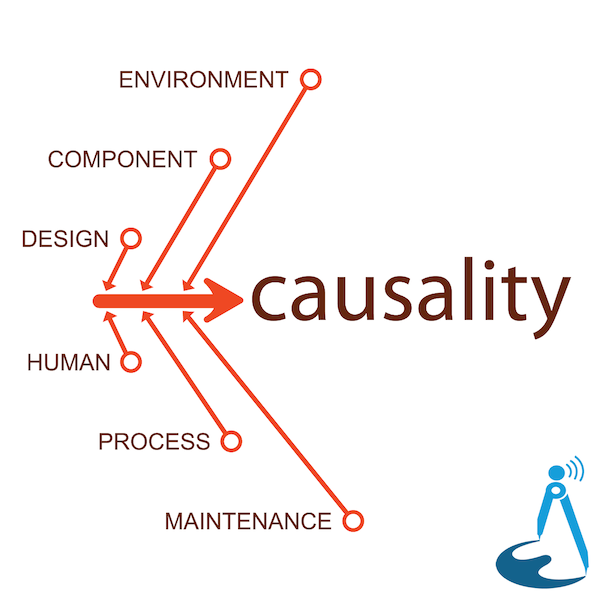
CURRENT
Causality
Chain of Events. Cause and Effect. We analyse what went right and what went wrong as we discover that many outcomes can be predicted, planned for and even prevented.
Premium supporters have access to high-quality, early released episodes with a full back-catalogues of previous episodes
SUPPORT CAUSALITY PATREON APPLE PODCASTS SPOTIFY PAYPAL ME
STREAMING VALUE SUPPORT FOUNTAIN PODVERSE BREEZ PODFRIEND
CONTACT FEEDBACK REDDIT FEDIVERSE TWITTER FACEBOOK INSTAGRAM
LISTEN RSS PODFRIEND APPLE PODCASTS YOUTUBE SPOTIFY
 PANDORA
GOOGLE PODCASTS
INSTAGRAM
STITCHER
IHEART RADIO
TUNEIN RADIO
CASTBOX FM
OVERCAST
POCKETCASTS
PODCAST ADDICT
CASTRO
GAANA
JIOSAAVN
AMAZON
PANDORA
GOOGLE PODCASTS
INSTAGRAM
STITCHER
IHEART RADIO
TUNEIN RADIO
CASTBOX FM
OVERCAST
POCKETCASTS
PODCAST ADDICT
CASTRO
GAANA
JIOSAAVN
AMAZON

Total Listening Time: 1 day, 9 hours, 57 minutes and 34 seconds.
John has a great voice to listen to. He’s also super smart and breaks the maths and such side of things down enough my brain doesn’t freak out haha. Thanks. Sam. Perth
Really enjoy John’s analysis of these famous safety incidents. Lots to learn here!
A wonderful podcast. Loving it!
I discovered this podcast in a roundabout way investigating Chernobyl & Fukushima. John Chigdey is a passionate genius, I love his delivery, knowledge and analysis. I have never heard of many of these incidents (NOT ACCIDENTS!). It's tragic how these mistakes pile up on each other until the inevtiable happens. Everything seems so safe and reliable until it doesn't. Even if you're not an engineer or a scientist this is a must listen series. I listened to them all pretty much straight in a row. There are lessons here applicable to just about every part of life.
A wonderful podcast. Loving it!
Great podcast. Just finished Fukushima and it’s amazing the amount of misinformation put out by other podcasts that talk about this incident. It’s great to get an engineering perspective on what happened. Keep up the great work.
Fascinating take on the world.
John does a wonderful of walking through and unpicking the incidents discussed. His expertise in control systems and how they factor into unfolding events make this a must listen for anyone with an interest in engineering matters. Keep listening and pay attention.
Thank you this is such a great resource for safety professionals; well researched and easy to listen to.
The disasters covered aren’t overly dramatized and are presented factually with an aspect I think many shows are missing: what was learned and what could be done differently. This is one of my new favorite podcasts
There is no better researched podcast than this one. Amazing telling of disasters with emphasis on engineering and science.
I am entirely fixated on disasters, and this is by far my favorite source. Clean covering, professional with a well of barely hidden rage at the powers that be that allowed these disasters to come to fruition, and a nice voice to boot. If I could give more stars I really really would.
This is one of the few podcasts where the podcaster understands what the word thorough means. No useless information is ever added. The subjects are interesting, heavy, and important. Sometimes it is dry, in the sense he is not making jokes, but that is a positive thing for this podcast but does mean it is not always the most accessible. I’m sure the podcaster knows this as he (to my glee) includes undiluted technical information to help explain the event.
This is a great podcast for me when I need a break from true crime. He talks about cataclysmic events not simply for the morbid entertainment, but to think about the “HOW” and “WHY” factors from the perspective of an engineer. Also, the dreamy Australian voice and calming tone of the narrator is everything. It’s oddly a compliment, but when I need to fall asleep to something that won’t give me nightmares in the way many others of the same genre might— he’s my guy!
As a teacher, I’ve found this podcast extremely valuable in learning great examples of why physics is important in our daily lives. He’s done a wonderful job in the recap of events and then the breakdown of where things went wrong. I highly recommend this podcast!
I enjoy having someone with a more analytical brain talk about what went wrong and why. Too many podcasts focus on the horror of what happened in disasters, as opposed to the causes beneath it. Or they focus on being entertaining and witty. I’d much rather hear someone with a background in science go through cause and effect, and what happens when people and systems fail. For a non scientist such as myself, it’s lovely learning how someone with, I assume, education and training in engineering, perceives man made disaster Great job to everyone involved in this podcast!
Great analysis of various disasters. Fascinating how greed has become one of the main villians in these disasters.
I am a maintenance electrician and it is so interesting how incorrect procedures or “tribal learning” leads to dangerous outcomes
A podcast for those with a brain
This podcast is awesome. Really interesting details explaining disasters from an engineering point of view.
John explains the causes of disasters in great detail—many of them about incredibly interesting events that I did’t even know about.
Fascinating take on the world.
YES THIS. When John goes off on a tear about engineering ethics and you can fully feel his passion on the subject, it gives one some hope for humanity. Another huge Positive: Causality episodes are evergreen, I often recommend them when a disaster comes up in conversation.
I can honestly say that I have spoken up about issues that I might have just 'let go' because of Causality. I have also started to communicate more clearly and explicitly at work to remove ambiguity and reduce miscommunication.
Jeeze I always thought causality was the best. Disaster pods are cool but they aren’t analytical. Feels like disaster pods make everything seem fated while causality exposes negligence and carelessness. The pod definitely adds value to history for me. Best one of them all 10/10
Yes. Let's also remember the shameful people who overrode the engineers raising alarms because they were worried about time and money. As John points out in Causality episode 8, waiting even one more day would have probably prevented this outcome.
The curious history of early aviation and failed engineering review processes @CausalityShow 10: The Comet
Great episode of @CausalityShow as a Quality Engineer the phrase legacy knowledge makes me cringe. Put it in a damn procedure.
been obsessing over the @causalityshow podcast: engr breaks down disaster in detail and gets to the moral background of engnrng.
The Causality podcast (by John) is great, offering detailed walkthroughs of other engineering-related incidents to explore how and why they happened, how they could have been prevented:
Causality - a fortnightly reminder of human frailty and hubris. Spellbinding frightening listening.
Latest Episode
Episode 62: OceanGate Titan
3 February, 2026A young company pushing to re-invent deep sea exploration with an initial focus on opening up tourism to the wreck of the Titanic, OceanGate garnered the fascination of many around the world. With a different approach to their hull design they forged ahead despite many warnings from experts in the field, concerned about their design decisions and materials choices. When the submersible imploded killing all five aboard including the company CEO, the experts were only surprised about how OceanGate had got as far as they had…before it all went horribly wrong.
With
John Chidgey.
Episode Gold Producers:
'r', Steven Bridle, Kellen Frodelius-Fujimoto and Steve Branam.
Episode Silver Producers:
Mitch Biegler, Shane O'Neill, Jared Roman, Katharina Will, Chad Juehring, Ian Gallagher and Jamie Russell.
Episode 31: Black Energy
4 October, 2019The evening before Christmas Eve in 2015 saw a widespread blackout of the power grid across the Ukraine. We look at how a cyber-attack on electric utility companies in Europe, changed how cyber-security is regarded in control systems, forever.
With
John Chidgey.
In Causality Explored, (Premium ONLY) we dive into GOOSE as a messaging protocol in High Voltage Circuit Breaker protection, why it's important and why it's opened a door for hackers that didn't exist 20 years ago.
Episode Gold Producer:
'r'.
Episode Silver Producers:
Carsten Hansen, John Whitlow, Joseph Antonio and Kevin Koch.
Episode 30: Tim Maia
5 July, 2019As part of Rio’s preparations for the Olympics in 2016 a cycling pathway was built adjacent to a narrow, congested roadway along a picturesque shoreline. When a section collapsed only months before the opening ceremony killing two people, the world looked on with growing concerns about the imminent Olympics.
With
John Chidgey.
In Causality Explored, (Premium ONLY) following the Tim Maia incident, we deep dive into Concrete construction methods and why steel reinforced concrete is flawed in many ways.
Episode Gold Producer:
'r'.
Episode Silver Producers:
Carsten Hansen, John Whitlow and Joseph Antonio.
Episode 29: Flight 1549
5 June, 2019In 2009 an AirBus A320 departing LaGuardia Airport in New York suffered a dual engine failure due to a bird strike during takeoff. In a highly improbable event an equally highly improbable landing in the Hudson River shocked and amazed the world. We look at what went right on Flight 1549.
With
John Chidgey.
In Causality Explored, (Premium ONLY) it was quite fortuitous that Flight 1549 was outfitted for EOW Operations (Extended Over-Water) and we look into just HOW lucky it was, and why many airlines in the USA don't equip their aircrafts with this additional lifesaving equipment.
Episode Gold Producer:
'r'.
Episode Silver Producers:
Carsten Hansen, John Whitlow and Joseph Antonio.
Episode 28: Hotel New World
10 May, 2019In 1986 an unremarkable building in Singapore collapsed killing dozens of people. We look at how the supervision of the construction and the design itself resulted in a structure that was at best critically stable, and ultimately one that could only ever fail.
With
John Chidgey.
Episode Gold Producer:
'r'.
Episode Silver Producers:
Carsten Hansen, John Whitlow and Joseph Antonio.
Episode 27: Gare De Lyon
5 April, 2019On the 27th of June, 1988 in central Paris a runaway train collided with a stationary train in Gare De Lyon station, claiming 56 lives and injuring 60 more. Whilst the court found the driver guilty and sent him to jail, was he solely to blame? We look at how poor design decisions made Gare De Lyon inevitable.
With
John Chidgey.
Episode Gold Producer:
'r'.
Episode Silver Producers:
Carsten Hansen and John Whitlow.
